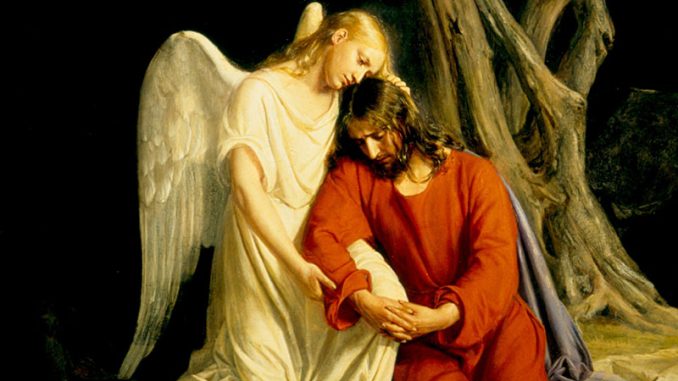
In his general audience, Pope Francis delivered a catechesis on the “Our Father”, focusing on the Lord’s Prayer in the light of the Holy Week, when Catholics around the world commemorate the solemn mysteries of the passion, death and glorious resurrection of Jesus. He picked out three prayers of Jesus to the Father during His passion.
The first invocation is from the Last Supper, when the Lord, “raised His eyes to heaven and said: ‘Father, the hour has come: glorify your Son’ — and then — ‘glorify me in your presence with the glory I had with you before the world began’” (Jn 17.1-5).
The pope pointed to the paradox of Jesus’ prayer, asking for glory when His “passion is at the gates”. He explained that this Biblical glory is the revelation of God, the distinctive and definitive manifestation of His presence and salvation among men. And Jesus is this manifestation, which He does at Easter, glorified as He is lifted up on the cross.
Thus God reveals His glory, removing the last veil and surprising us as never before. We discover that the glory of God is all love: pure, unbridled and unthinkable love, beyond all limits and measures.
The pontiff urged Christians to pray like Jesus, asking the Father that they be able to accept that “God is love”. Many times, he said, we imagine God as master and not as Father, a severe judge and not as a merciful Saviour.
At Easter, Pope Francis said, God closes distances, revealing Himself in the humility of a love that demands our love. And when we live everything with love and from the heart, we give Him glory, because “true glory is the glory of love”. Only love gives life to the world.
He then spoke about Jesus’ prayer in the Garden of Gethsemane after His Last Supper. While His disciples are asleep and Judas is coming with the soldiers, Jesus feels the “fear and anguish” of the betrayal, contempt, suffering and failure that await Him. In the abyss of his sadness and desolation, he addresses His Lord with the “most tender and sweet word: ‘Abba’”, that is, Father.
In His trials, Jesus teaches us to embrace the Father in prayer in order to find the strength to go through pain. “Amidst trials,” Pope Francis said, “prayer brings relief, trust and comfort.” In His abandonment and interior desolation, Jesus is not alone, He is with the Father.
On the other hand, in “our Gethsemane” we often choose to remain alone instead of crying out to the Father and entrusting ourselves to Him, as Jesus did. By remaining closed in ourselves we dig a tunnel within, a painful introverted path that only goes deeper and deeper into ourselves.
The pope noted that our biggest problem is not pain, but how to deal with it. He said it is prayer and not solitude that offers a way out because prayer is relationship and trust. Jesus entrusts everything to the Father, bringing Him His feelings and counting on Him totally in His struggle. Recalling that each of us has his or her own Gethsemane, he urged Christians to pray to the Father.
Finally, the Holy Father drew attention to the third prayer of Jesus: “Father, forgive them, for they know not what they are doing.” (Lk 23,34). At the moment of His crucifixion, Jesus prays for those who were wicked to Him and His killers. It is at that moment of most acute pain, when His wrists and feet are pierced with nails and when pain reaches its peak, love reaches its climax. Forgiveness, the gift of immense power, then arrives breaking the circle of evil.
In conclusion, Pope Francis exhorted Christians to pray for the grace to live their days with love for the glory of God; to know how to entrust ourselves to Him amid trials, calling him “Father”, and in encountering Him to find forgiveness and the courage to forgive.
“The Father forgives us and He gives us the courage to be able to forgive,” the pope added.
By Robin Gomes/Vatican News

